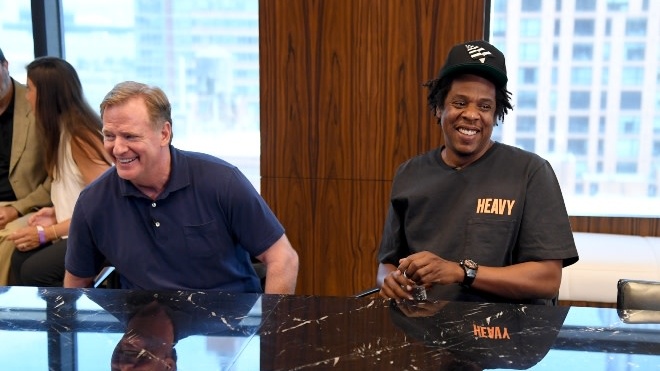If you’re interested in sharing your opinion on any cultural, political or personal topic, create an account here and check out our how-to post to learn more.
When the news broke that Jay-Z’s Roc Nation reached an agreement to partner with the NFL, responses varied between excitement over the prospect of equity and representation within the NFL and, a drastic sense that Hip-hop's first billionaire sold out those he claimed to represent. While the details of the agreement have mostly remained mostly undisclosed, rumors have surfaced that part of the deal involved “Hova” getting a majority stake in an NFL team. No doubt this may raise some red flags in the minds of many Black Americans. Some have even gone so far as to depict Mr. Carter as a “Judas to Black America” and this deal is set to serve as his 30 pieces of silver. While the criticism isn’t without some degree of merit, let’s first take a moment to examine its validity.
One of the first topics that needs to be addressed is the goal of this kneeling protest. In an Aug 2017 article, the then 49ers strong safety Eric Reid is quoted as saying “…I think our goal is to just keep talking about it. Hopefully, we … inspire people to do something about it through our protests.” Almost two years on from this statement; it is safe to say that this issue has nearly eclipsed every other story in the sports world. The original protest has sparked similar protests from athletes of color in a wide array of sports and varying degrees of professional status. Since the time of this statement Colin Kapernick and the NFL have agreed to a settlement that granted Kaepernick an estimated $8 million and the ability to continue to play in the NFL. At the time, even this deal was seen as a betrayal against the Black Lives Matter movement. Many have noted that Kapernicks' recent deal with Nike is only another form of exploitation, allowing the company to profit off of the social justice movement.
It's important to put into perspective exactly what Jay has done for the Black community over the past 3 years. This is the same person who raised money for Trayvon Martin’s family, raised money for Sean Bell’s fiancé and paid tuition for their kids, lobbied Gov. Cuomo to appoint a special prosecutor in the Eric Garner murder, lead a PR campaign to free Meek Mill on spurious and hyperbolic charges, and turned down a SuperBowl halftime show the same year Kaepernick was blackballed by the league, and discouraged Travis Scott from performing. While these actions don’t absolve any possibility of betrayal it does demonstrate a track record of addressing the needs of the community.
At some point, we must acknowledge that while a protest is an effective tool, it must have actionable metrics and achievable goals. If the goal of kneeling was to bring awareness to the problem of systemic racism and police violence, then that goal has been accomplished, if the goal is to end systemic racism then it is necessary to question its effectiveness at achieving this goal. There is no doubt that the system is built to keep “us” out, but having someone who represents our interests on the inside of that system may prevent another Kapernick situation from happening. Instead of keeping the status-quo of all-white male NFL owners, having just one person of color in that circle may allow for the creation of systemic change. While this notion may seem rather idealistic we must remember that it was brother Marcus Garvey who said: “…whatever you want in life you must make up your mind to do it for yourself.”
The best that any of us can do is wait and see how this all plays out. In the worst case, we have a Black NFL owner who continues to ignore the problems of the community that makes up a majority of the NFL, which would really be no different from how it is now. In the best case, we have someone who can represent us in the NFL boardrooms, and provide access to what was once an exclusive whites-only club.
